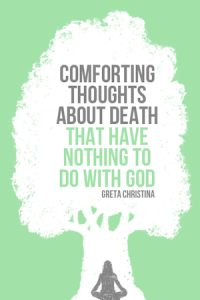 I’m late to the party, but Greta Christina has a new book on death and dying as it relates to unbelievers. So far available only in audiobook and digital versions, ordering links to Comforting Thoughts About Death That Have Nothing to Do with God are listed on her blog.
I’m late to the party, but Greta Christina has a new book on death and dying as it relates to unbelievers. So far available only in audiobook and digital versions, ordering links to Comforting Thoughts About Death That Have Nothing to Do with God are listed on her blog.
An earlier post on Alternet covers the ground on what to say as a bystander to someone dealing with death — When It’s Not God’s Plan: 8 Things to Say to Grieving Nonbelievers.
Finally, one of my own thoughts on the subject, first posted on Facebook. Someone grieving a lost pet remarked on how comforting it must be to think of being reunited with him, and I tried to provide a gentle but realistic response:
It is absolutely normal to want death to NOT BE. Every one of us feels that. And I certainly don’t blame anybody for falling for a comforting just-so story about afterlives and happy reunions.
But in my own case, I can’t allow myself to believe in any such thing. Not only do I believe it to be untrue, and personally destructive for just that reason, I think the belief across all of society and all of history has been hugely poisonous. IMHO, the side effects of it have impacted everything we do, and in a negative way.
One of my personal goals is to live in Real Reality, to attempt to understand and savor it in all its glory and pain. To see what I can learn from it, even amidst the pain of the loss of loved ones. I doubt many people throughout human history have tried to do this, which makes us (I hope it’s not just me) pioneers and adventurers of a rare sort.
I sense that there’s something very important — revolutionary, even — and extremely life-affirming waiting to be discovered, if we can avoid falling into the old, old trap of the mystical. It may be as simple as that the constant consciousness of impending death helps us enjoy the in-the-moment closeness with others, but it may be something much more profound.
I’ve gradually come to understand that losing my dogs and my dad, while horrible, gives me the daily joy that I had THAT, that love, that relationship, that closeness. Nothing can take that away, nothing can change that.
We live in the day-to-day moments and don’t notice how special they are — I think because we CAN’T do both at the same time, live them and notice them. It’s only after we lose someone that we see the Golden Moments for what they were and are — the purest joys that life can offer.
When you think about it, this is a gift that death gives, the conscious appreciation for what we had. We can’t have the moment anymore, but we can have the joy, the realization that something special and wonderful is still a part of our lives, our memories, and that we’re immensely richer for having had that living presence in our lives, and for now having those permanent memories. The time of pain is a doorway to this larger joy.
It seems to me that believing in an afterlife-myth cheapens and blunts this process. We think “Oh, I’ll see him again,” and it slides us away — as individuals and as an entire civilization — from the pain, yes, but also from the fullness of this other understanding.
It seems to me that facing death in full vulnerable honesty should transform you, make you into something bigger and better. And it seems to me that a civilization-wide history of denial, so that few of us ever experience this transformation, has made us small and … terrible.
Facebook friend Dorothy Grasett added: “If you live in the ‘Real Reality’ you also remember that there are no make-overs – if you hurt someone, something, somewhere, you don’t get to go back and be really sorry and get forgiven after you die. (Or they do). I always found that belief to be a cop-out.”
